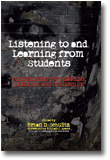
Listening to and Learning from Students
Possibilities for Teaching, Learning, and Curriculum
Edited by:
Brian D. Schultz, Northeastern Illinois University
A volume in the series: Landscapes of Education. Editor(s): William H. Schubert, University of Illinois at Chicago. Ming Fang He, Georgia Southern University.
Published 2011
This book embraces the idea of listening to and learning from students. Although many educational theorists have long argued that incorporating children’s perspectives about teaching and curriculum has the potential for increasing students’ interest and participation in learning, their radical perspectives are still ignored or dismissed in theory and practice. Through featured essays, historical excerpts, and provocative poetry, this collection provides research literature and inquiry ideas that ought to be part of educational debates, policy discussions, and decision makings. Articulated through thoughtful prose and discerning analysis, youth, teachers, and scholars featured in this collection illuminate the power and promise of not only listening to and learning from students, but also acting upon the insights of students. This book calls for the 21st century educational workers--teachers, educators, parents, community workers, administrators, and policy makers--to perceive students as massive reservoirs of knowledge that invigorate possibilities for teaching, learning, and curriculum in the contested educational landscape.
CONTENTS
Acknowledgements and Preface. Foreword: Listen and Learn, William C. Ayers. Curricular Possibilities: Listening to, Hearing, and Learning from Students, Brian D. Schultz. Interlude: From Pedagogy of the Oppressed, Paulo Freire. Confronting “Limit Situations” in a Youth/Adult Educational Research Collaborative, Tara M. Brown and Kevin Galeas. Interlude: from the mouths of babes, Kevin Coval. Learning to Walk Quietly, Cathy Coulter. Interlude: My First Voyage, L. Thomas Hopkins. A Shorty Teaching Teachers: One Kid’s Perspective About “Keepin’ It Real” in the Classroom, Brian D. Schultz and Paris Banks. Interlude: What Is a School? From I Learn From Children, Caroline Pratt. Ninth-Grade Student Voices in a Social Action Project: “They Went for Us, They Cared”, Shira Eve Epstein. Interlude: Hi(story) & Hope: How the Stories of Our Individual and Collective Pasts Determine What We Believe is Possible, kahlil almustafa. They Think Kids Have Nothing to Say, Lloyd Thomas. Listen, Miracle Graham. Challenging Test-Prep Pedagogy: Urban High School Students Educate Pre-Service Teachers Using Liberatory Pedagogy, Louie F. Rodríguez. Interlude: From Prospectus for a Summer Freedom School Program, Charles Cobb. Lessons from the Journey: Exploring Citizenship through Active Civic Involvement, Jennifer Ponder, Michelle Vander Veldt, and Genell Lewis-Ferrell. Interlude: A.D.D., Rafael Casal. Let My Soul Spit: Young People Write for Reflection and Inspiration, Susan Wilcox. Interlude: Things I Wish I Told My Grandma, kahlil almustafa. Constructing and Constricting Teachers: RateMyTeachers.com as a Knotted Space of the Educational Imaginary, Jake Burdick. Interlude: The Moral Training from Methods of Instruction, John Dewey. Teaching John Dewey as a Utopian Pragmatist While Learning from My Students, William H. Schubert. Interlude: Desirable Content for a Curriculum Development Syllabus Today: The Tyler Rationale Reconsidered, Ralph W. Tyler. Student-Led Solutions to the Dropout Crisis: A Report by Voices of Youth in Chicago Education, Voices of Youth in Chicago Education (VOYCE). Afterword: Prayer for the First Day of Chicago Public School, Kevin Coval. Permissions. About the Contributors.
REVIEWS
"Insightful, cogent, provocative, illuminating, and just plain common sense. These are just some of the words that describe this collection of essays. Listening to and Learning from Students is just what we need to counter some of the non-sense spewing from policymakers and think tanks that believe they control the future of education reform. They would do well to listen to those who have the most at stake." Pedro Noguera New York University
"The essays in this book are like a fresh breeze blowing through the forest of unresolved arguments about relations between teachers and students and their implications for curriculum. Rather than thinking in terms of either-or, the writers propose multi-faceted dialogues that might make audible the concerns and perspectives of students for those willing to listen. Gates to what has been called a ‘culture of silence’—now including the young—may blow open, and roads not normally taken in classrooms may become pathways to possibility." Maxine Greene Teachers College, Columbia University
"Brian Schultz has gathered together a range of classics and contemporaries, a diversity of theorists and practitioners, young and old, of many backgrounds and colors and circumstances in order to ask... questions anew, and at the same time to open up a unique space to re-imagine and repopulate the principles of democracy and education today." William Ayers University of Illinois at Chicago in from the forward
-
Paperback978-1-61735-171-6
Web price: $45.04 (Reg. 52.99)
-
Hardcover978-1-61735-172-3
Web price: $80.74 (Reg. 94.99)
- eBook9781617351730

-
 A Curriculum of Imagination in an Era of Standardization
An Imaginative Dialogue with Maxine Greene and Paulo Freire
A Curriculum of Imagination in an Era of Standardization
An Imaginative Dialogue with Maxine Greene and Paulo Freire
-
 Contemporary Urban Youth Culture in China
A Multiperspectival Cultural Studies of Internet Subcultures
Contemporary Urban Youth Culture in China
A Multiperspectival Cultural Studies of Internet Subcultures
-
 From Socrates to Summerhill and Beyond
Towards a Philosophy of Education for Personal Responsibility
From Socrates to Summerhill and Beyond
Towards a Philosophy of Education for Personal Responsibility
-
 Living the Questions
Dispatches From a Life Already in Progress
Living the Questions
Dispatches From a Life Already in Progress
-
 Mandy Hoffen and a Conspiracy to Resurrect Life and Social Justice in Science Curriculum with Henrietta Lacks
A Play
Mandy Hoffen and a Conspiracy to Resurrect Life and Social Justice in Science Curriculum with Henrietta Lacks
A Play
-
 Necessary Spaces
Exploring the Richness of African American Childhood in the South
Necessary Spaces
Exploring the Richness of African American Childhood in the South
-
 Sensuous Curriculum
Politics and the Senses in Education
Sensuous Curriculum
Politics and the Senses in Education

